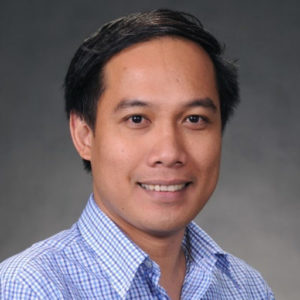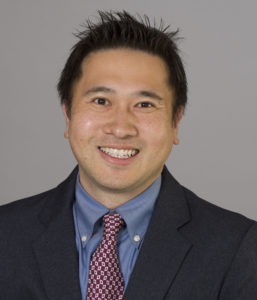An Interview with Dr. Johnah Galicia
By Gordon Lai, D.D.S.
Recently, I had the privilege to sit down and interview Dr. Johnah Galicia who serves as the director of the University of the Pacific Arthur A. Dugoni School of Dentistry’s Graduate Program in Endodontology and as a trustee on the Foundation’s Board of Trustees. Dr. Galicia is someone I am proud to call one of my mentors. Not only is he busy teaching and mentoring residents, Dr. Galicia also serves on multiple AAE and ADA committees.

Johnah C. Galicia, D.M.D., M.S., Ph.D.
Now, you may ask, why are we interviewing Dr. Galicia in particular? Dr. Galicia has had a long affiliation with the Foundation for Endodontics and was also the recipient of the Foundation’s Endodontic Educator Fellowship award which he credits to helping him develop into the educator he is today. Dr. Galicia also just published what very well may be the first study exploring the response of dental pulp to SARS-Cov2 infection; you can read the study here.
Dr. Gordon Lai: You have an interesting pathway to becoming an endodontist- can you tell us about your academic background and what ultimately led you to the field of endodontics?
Dr. Johnah Galicia: I hope that people would find my academic background interesting, but I definitely took a longer path compared to most endodontists who became specialists before they turned 35, some before reaching 30. That makes me feel really old! However, the years of studies, research and clinical practice that I gained helped me tremendously in securing a residency spot at UNC and in receiving a prestigious fellowship award from the AAE Foundation.
I have always been interested in endodontics, but I had opportunities earlier in my career to be mentored by periodontists in France, in Japan, and here in the US. It was not until 2009 when I moved to the University of Pennsylvania that my interest in endodontics resurfaced. There, I met Dr. Martin Trope who inspired me to become an endodontist. We worked on a project together on regenerative endodontics, which I found really interesting from a periodontic researcher’s point of view. I was culturing a lot of primary gingival epithelial and I knew that regeneration would be vast in the future. This started a reading frenzy on tons of endodontic literature. I became more interested in endodontics and I realized I would have a niche in the specialty.
GL: Were you always interested in an academic career?
JG: Yes, and this is due to the environment that I was raised in. Teaching is deeply rooted in my family and in my consciousness. I grew up in a family of academicians – my mother retired as a professor after 38 years of service.
GL: Can you tell us how the Foundation for Endodontics has helped you in your career?
JG: I am in my position now as an endodontic graduate program director at the University of the Pacific because of the Foundation’s support. I did not need to worry about paying student loans, so I was able to pursue a career in academia straight out of residency. I finished my residency on June 30, 2014 in North Carolina, took a red-eye flight to San Francisco and started working the next day. Crazy, isn’t it? The Foundation also provides a lot of support for continuing education and research for educators.
GL: I know you served on the Research and Scientific Affairs Committee (RSAC), a committee of the AAE that is led by Foundation staff. Where do you think the future of endodontics research is headed?
JG: That’s a good question. During one of the RSAC’s meetings in Chicago, I remember the committee members discussing how the questions that endodontic researchers had over 25 years ago are still being asked today. We have gained some strides in endodontic research; however, we certainly need to develop better diagnostic methods, reevaluate how we measure outcomes and investigate new materials on the market. Research in regenerative endodontics, which the Foundation has funded generously in the past five years, has yielded some answers and spawned many interesting questions. So, I guess in the short term, research in these areas will continue but their translational value will be emphasized and tested more intensely.
In the long term, advances in medical research will influence endodontic research. Gene therapy, biosensor and artificial intelligence research will continue to flourish. Wouldn’t it be amazing to use a quick, chairside diagnostic tool using the patient’s own immune response to accurately diagnose and stage pulpitis or apical periodontitis? And then, instead of removing the entire vital pulp, only the inflamed part is removed and a bioactive nanoparticle paste is placed over the pulp or in the root canal that will regenerate the dentin-pulp complex?
GL: For residents who are considering pledging money to the Foundation for Endodontics, what would you tell them about the importance of giving?
JG: Giving to the Foundation is securing your specialty’s future. It funds educators that teach you and your future colleagues, it helps generate knowledge to establish and advance our specialty’s important role in the dentistry and it funds generous pursuits to reach out and help communities achieve better health.
****
 Dr. Gordon Lai is a member of the Foundation’s Resident Expert Advisory Council. He recently graduated from endodontic residency at University of the Pacific Arthur A. Dugoni School of Dentistry and now splits his time between teaching predocs/residents at UOP as well as associating in a private endodontic practice. You can read more about Dr. Lai here.
Dr. Gordon Lai is a member of the Foundation’s Resident Expert Advisory Council. He recently graduated from endodontic residency at University of the Pacific Arthur A. Dugoni School of Dentistry and now splits his time between teaching predocs/residents at UOP as well as associating in a private endodontic practice. You can read more about Dr. Lai here.




